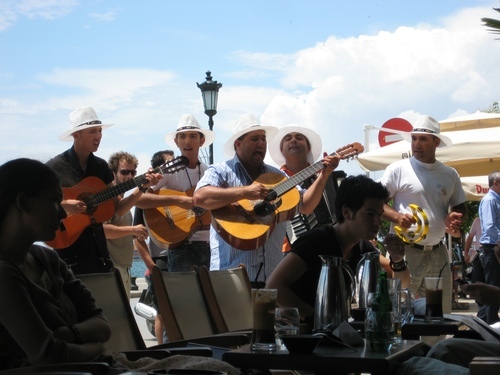One of the advantages of living in Israel is that we're located near many of the places we've always wanted to see. So two weeks ago my husband and I zipped over to Greece for a weekend in Thessaloniki.
The location was not entirely up to us -- we were there for the Loreena McKennitt concert. And what we discovered is that while the islands of Greece and all its southern attractions are as enticing to us as ever, we had a wonderful time in Greece's second-largest city and cultural capital, which is otherwise known as Salonika.
Located in northern Greece, Thessaloniki's proximity to the Balkans means that it represents a fusion of Byzantine, Roman, Ottoman and Greek influences (the Jewish influences are mostly gone since the Holocaust). Scattered throughout the city are whatever artifacts that remain -- a Roman rotunda and arch, Ottoman bathhouses which now house contemporary art exhibitions, and a Byzantine wall and churches.
Thessaloniki is very far from the classic tourist fantasy of Greece: there are no nearby islands, and Delphi and Athens are a great distance away. But there are other treasures nearby: Mount Olympus and the fascinating archaeological park that is near it, ancient Dion, home to the remains of several ancient temples and amphitheaters. Gazing at the spectacular and cloud-hidden peaks of Mount Olympus, I could imagine that thousands of years ago, people believed that the gods resided there.
Thessaloniki itself is the epitome of cool. I know, I'm a former English major and yet "cool" is the best word I can come up with to describe the city. I felt, strolling the squares where attractive young people congregated at elegantly lit outdoor tables, music pouring out of the various bars into the streets, that even in my late twenties I was way too old and uncool for this place. I have never seen a city more lively, more fully engaged in a passionate dance with life -- and I have been to several of the world's major cities. The sheer number of cultural events alone is enough to elevate the city's cool factor -- the concert we were there to see was only one of the many that were going on in that week, and free art exhibitions were everywhere.
The downtown area overlooks a waterfront, where the waves gently lap against the port docks. The waterfront is lined with cafes, each more trendy and appealing than the last. In the late afternoon on a weekend, the outdoor tables of these cafes are packed to capacity, where people indulge in ice coffee with cookies (nearly everything in Thessaloniki seems to be accompanied by two things -- pastries and cigarettes). They will sit there for hours until the sun sets over the water.
It's much later by then, since the summer days are long, and that's when people repair to the tavernas and bars located near the waterfront but not on it, near Aristotle Square and the quaint downtown area of Ladadika. Some of these tavernas are famous for serving some of the best food in Greece. The love of desserts is reflected in the myriad patisseries and bakeries that seem to be around every corner.
The bars on Aristotle Square reinforced Thessaloniki's image as the height of cool. Softly lit tables surrounded by plush couches line the entire square, and the square itself is alive with music and children until very late. Live music is everywhere--we were serenaded by a group of musicians as we sipped coffee by the waterfront. Their rhythmic singing, and the lapping of the water, and the constant sea breeze, are a memory that soothes me every time I conjure it again.
The city is situated on a hill, and at the top are the crumbling remains of an ancient Byzantine castle and wall. From here, you can see panoramic views of the city and the blue water stretching into the distance. Wandering the old Ottoman town that surrounds the castle, Ano Poli, you stroll evocatively winding streets and alleyways, catching glimpses of the ocean far below. The Osios David, an ancient church from the dawn of Christianity, is situated with a prime view of the ocean. Its fading fifth century mosaic and twelfth century frescoes are explained by an elderly woman who prays as you look around, and at the end demands a euro.
In general, the people of northern Greece were the kindest and most generous that I've encountered anywhere. From a group of elderly men sitting outside their workshop in the middle of an industrial zone, to a hotel concierge of a five-star hotel where we were not staying, to the woman who offered me her umbrella at the concert when it began to rain, people would either help us, or go out of their way to find someone who could, even though it was never to their benefit. They rarely spoke English, and we seemed to be a rarity, as most tourists to Thessaloniki are European.
I still want to visit Athens someday, and elsewhere in Greece. But by visiting a place that most tourists overlook, I think we caught Greece with its hair down, and heard it sing.

